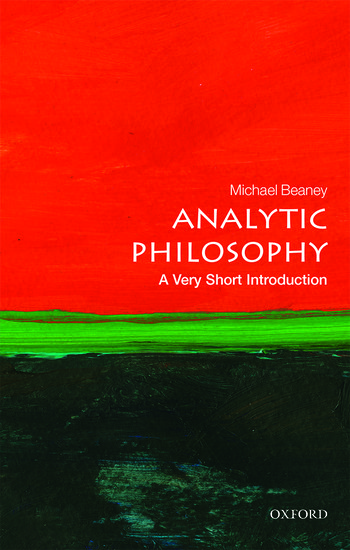Home >
A Very Short Introduction >
Analytic Philosophy (Philosophy)
A Very Short Introduction | Philosophy
Analytic Philosophy
ISBN: 9780198778028
Series: A Very Short Introduction
Analytic Philosophy (Philosophy)
A Very Short Introduction Analytic Philosophy (Philosophy) Media > Books > Non-Fiction > Education Books Expect Delays of Up to 4 Weeks| Order Below |
ISBN
9780198778028 (10-digit ISBN: 0198778023)
- Description
- Key Features
- Series Description
- Table of Contents
- Offers a clear, accessible introduction to analytic philosophy, introducing some of the key ideas of five of its main founders
- Illustrates the fruitfulness and conceptual creativity of analytic philosophy
- Explores the spread of analytic philosophy to become the dominant philosophical tradition across the world
- Discusses the criticisms of analytic philosophy
Originating in the pioneering work of Gottlob Frege, Bertrand Russell, G. E. Moore, and Ludwig Wittgenstein in the four decades around the turn of the twentieth century, analytic philosophy established itself in various forms in the 1930s. After the Second World War, it developed further in North America, in the rest of Europe, and is now growing in influence as the dominant philosophical tradition right across the world, from Latin America to East Asia. In this Very Short Introduction Michael Beaney introduces some of the key ideas of the founders of analytic philosophy by exploring certain fundamental philosophical questions and showing how those ideas can be used in offering answers. Considering the work of Susan Stebbing, he also explores the application of analytic philosophy to critical thinking, and emphasizes the conceptual creativity that lies at the heart of fruitful analysis. Throughout, Beaney illustrates why clarity of thinking, precision of expression, and rigour of argumentation are rightly seen as virtues of analytic philosophy.
Oxford's Very Short Introductions series offers concise and original introductions to a wide range of subjects--from Islam to Sociology, Politics to Classics, Literary Theory to History, and Archaeology to the Bible.
Not simply a textbook of definitions, each volume in this series provides trenchant and provocative--yet always balanced and complete--discussions of the central issues in a given discipline or field. Every Very Short Introduction gives a readable evolution of the subject in question, demonstrating how the subject has developed and how it has influenced society. Eventually, the series will encompass every major academic discipline, offering all students an accessible and abundant reference library.
Whatever the area of study that one deems important or appealing, whatever the topic that fascinates the general reader, the Very Short Introductions series has a handy and affordable guide that will likely prove indispensable.
Please note: As this series is not ELT material, these titles are not subject to discount.
Introduction
1: How many things are there?
2: How can we speak of what does not exist?
3: Do you know what I mean?
4: Are there limits to what we can say and think?
5: How can we think more clearly?
6: So what is analytic philosophy?
References
Further Reading
Glossary
Index
Originating in the pioneering work of Gottlob Frege, Bertrand Russell, G. E. Moore, and Ludwig Wittgenstein in the four decades around the turn of the twentieth century, analytic philosophy established itself in various forms in the 1930s. After the Second World War, it developed further in North America, in the rest of Europe, and is now growing in influence as the dominant philosophical tradition right across the world, from Latin America to East Asia. In this Very Short Introduction Michael Beaney introduces some of the key ideas of the founders of analytic philosophy by exploring certain fundamental philosophical questions and showing how those ideas can be used in offering answers. Considering the work of Susan Stebbing, he also explores the application of analytic philosophy to critical thinking, and emphasizes the conceptual creativity that lies at the heart of fruitful analysis. Throughout, Beaney illustrates why clarity of thinking, precision of expression, and rigour of argumentation are rightly seen as virtues of analytic philosophy.
Key Features
- Offers a clear, accessible introduction to analytic philosophy, introducing some of the key ideas of five of its main founders
- Illustrates the fruitfulness and conceptual creativity of analytic philosophy
- Explores the spread of analytic philosophy to become the dominant philosophical tradition across the world
- Discusses the criticisms of analytic philosophy
Series Description
Oxford's Very Short Introductions series offers concise and original introductions to a wide range of subjects--from Islam to Sociology, Politics to Classics, Literary Theory to History, and Archaeology to the Bible.
Not simply a textbook of definitions, each volume in this series provides trenchant and provocative--yet always balanced and complete--discussions of the central issues in a given discipline or field. Every Very Short Introduction gives a readable evolution of the subject in question, demonstrating how the subject has developed and how it has influenced society. Eventually, the series will encompass every major academic discipline, offering all students an accessible and abundant reference library.
Whatever the area of study that one deems important or appealing, whatever the topic that fascinates the general reader, the Very Short Introductions series has a handy and affordable guide that will likely prove indispensable.
Please note: As this series is not ELT material, these titles are not subject to discount.
EASY ORDER FORM
PRICES LISTED INCLUDE CONSUMPTION TAX
Price Before Tax:
¥1,790


